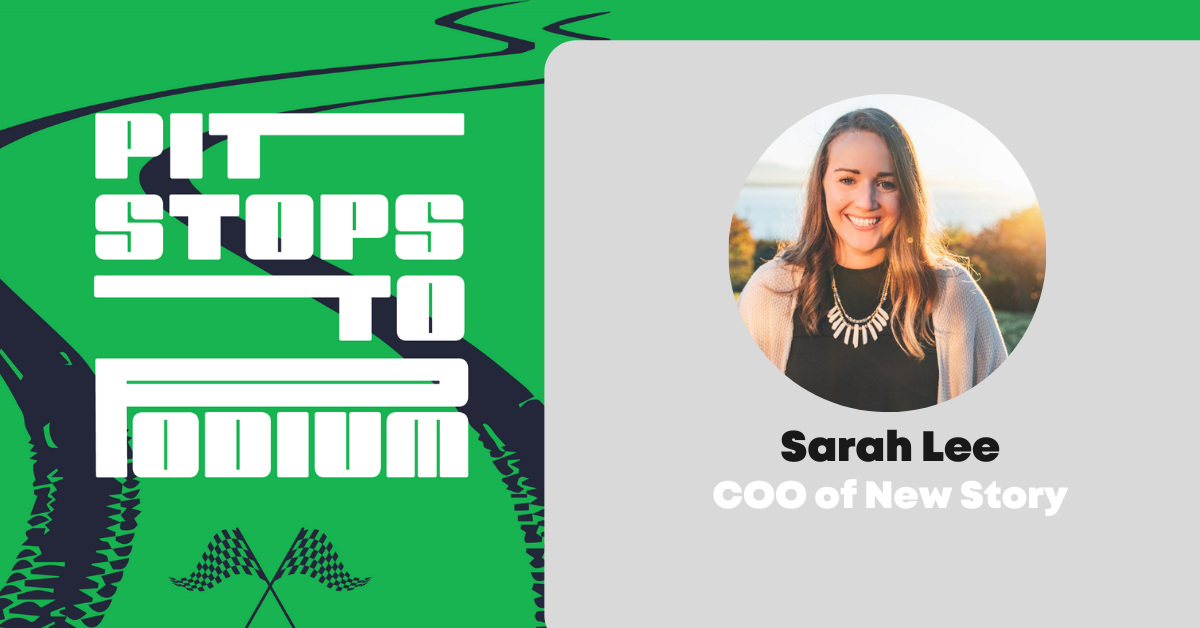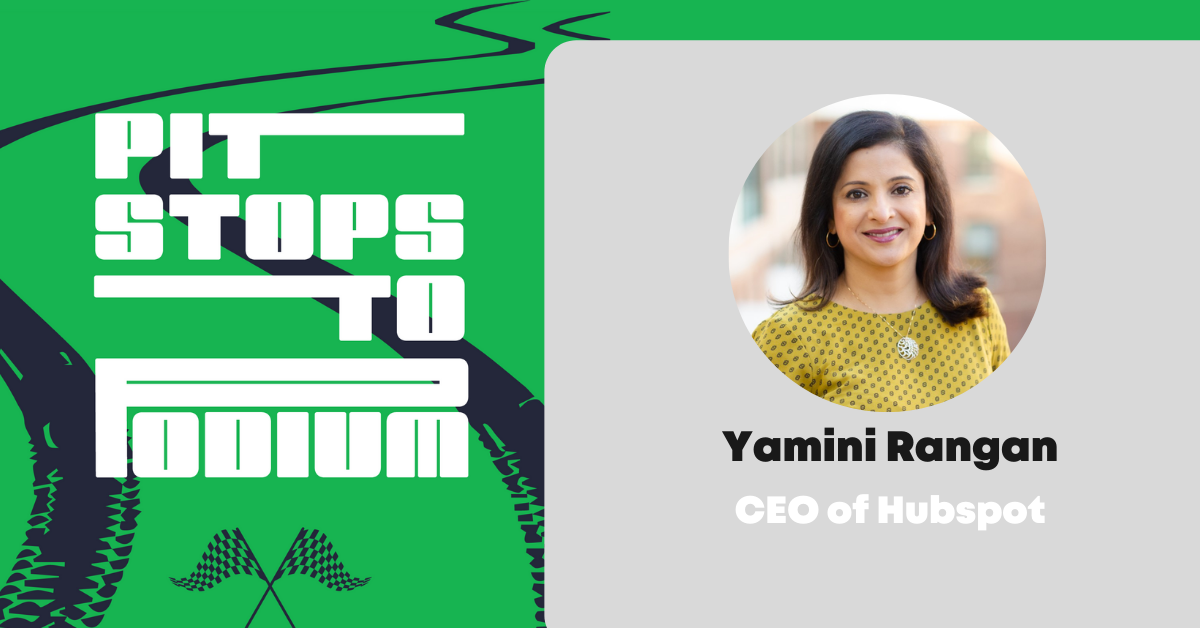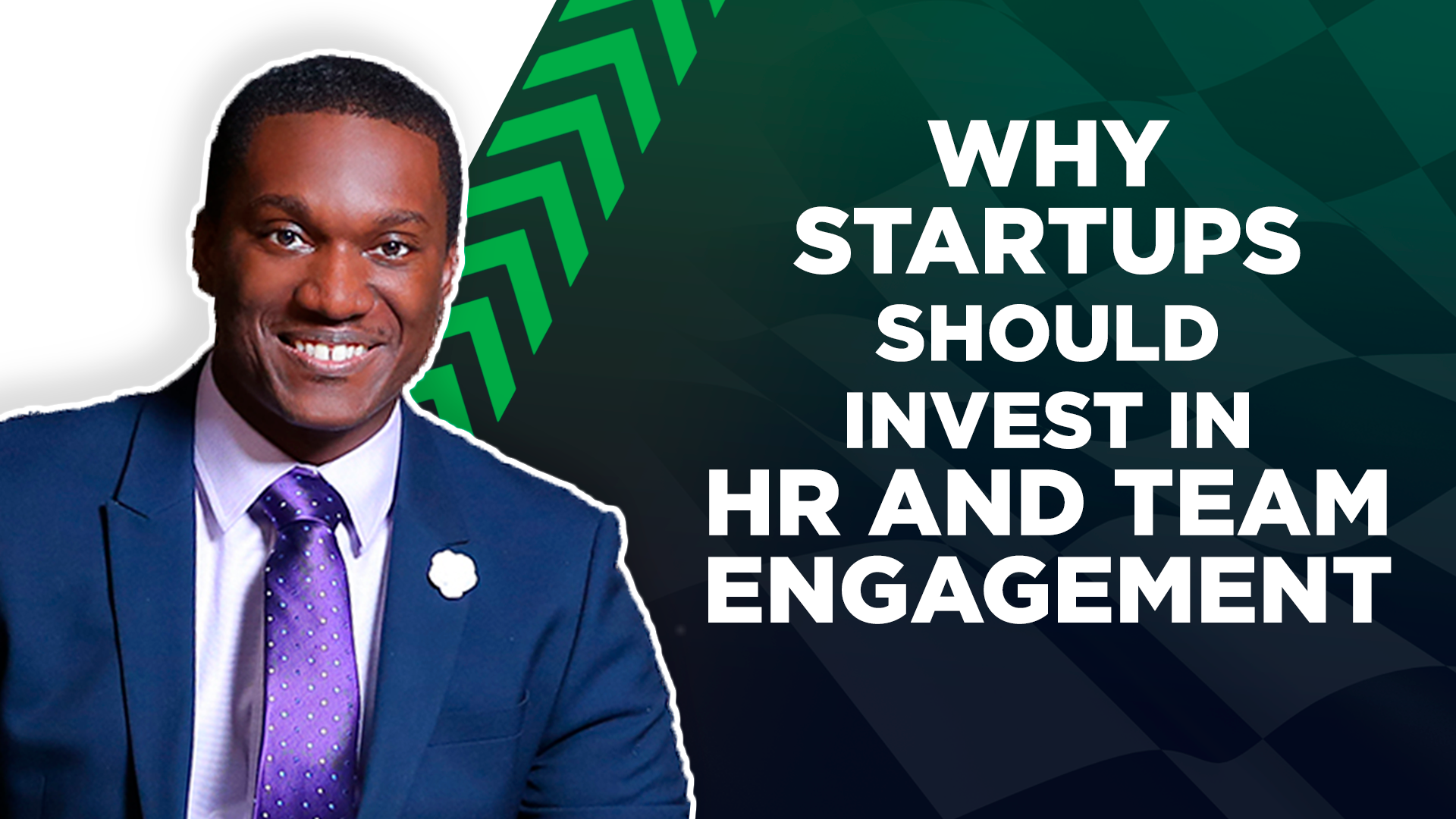Table of Contents
Keeping it Human: How to Stay Scrappy and Relatable as You Scale
In this episode of Pit Stops to Podium, Sarah Lee reveals why balancing human elements with professionalism is so crucial for scaling companies. As the COO of New Story, Sarah shares the unique perspective of a quickly scaling nonprofit focused on pioneering solutions to end global homelessness. Learn from “Crew Chief” Sarah how to keep the ingenuity and relatability that many business leaders don't even realize are slipping away.
Take 20 minutes to listen and then head back to the races! 🏁🏆
Pit Stop Highlights
- Hear how the New Story team maintain the ingenuity and grit present at early growth stages as they have increased their global impact and grown their team
- Learn more about what Sarah means by, "nothing is ever perfect and nothing is ever as perfect as it could be"
- Quick Application: What is some ways to stay human through scale?
- Stay Nimble: make sure everyone has the freedom and flexibility to look outside of the box that’s right in front of them so they aren't confined by their role.
- Talk/write like a human: Don’t over templatize!! Keep things excellent & professional, but work to make them stand out with natural, human elements.
Connecting with Sarah + New Story
- Website: https://newstorycharity.org/
- Social: @newstorycharity
- Check out The Neighborhood to start your monthly global impact!
- Connect on Twitter @Sarahtothelee and Linkedin
Full Transcript
BT: Hey, everybody, welcome to Pit Stops to Podium, the RevPartners podcast where we talked to execs who have competed and won taking their companies from high growth, high scale. Well, my name is Brendan Tolleson. I am the co-founder and CEO of RevPartners. And I'm delighted to introduce my guest today, Sarah Lee. Sarah, welcome to the podcast!
SL: Hey, Brendan, I'm excited to be here.
BT: Well, Sarah has become a friend. Sarah is currently serving as the COO of an amazing company called New Story, one of my favorite companies, really out there. And Sarah, how about you give our audience a little bit of background on who news story is, your mission, your vision, etc., because I think it's pretty compelling for sure.
SL: So probably different than a lot of guests that you have. News story is a nonprofit. So we are focused on pioneering solutions to end global homelessness. And a really practically that means that we build homes and communities throughout Haiti, El Salvador, Bolivia and Mexico. And in those countries we felt about 2,500 homes in our first six years.
BT: Yeah, it's great and yeah, I mean, I think to your point, this is our first non profit, but what's really even the mission is amazing. And it's been picked up by a variety of places. How about you walk them through the Y Combinator? It's a really compelling narrative, especially for our audience.
SL: Yeah, for sure. So two things people love to talk about with New Story. Number one is we were one of the first nonprofits to go through Y Combinator. So many people know Y Combinator as one of the top startup incubators. They have hosted people like, you know, airbnb, dropbox, some of the world's biggest companies, and New Story was able to go through that. Right and the benefit of that as a nonprofit is they treat you just like everybody else. And so it is the same in insane growth targets that they have on the week to week basis during Y Combinator. And so that is really how New Story got started. The other thing that is something people often ask about, if they are like, I feel like I've heard of these people, but I'm not quite sure. We also completed the world's first 3D printed community, where families who are living on less than $3 a day are moving in. And so a lot of people also know that, oh, yeah, you're the nonprofit that did 3D printing homes for vulnerable families.
BT: The way my mind works is I try to simplify it to the millennial version of Habitat for Humanity. I don't know if that's a fair comparison, but it helps me kind of articulate what you guys do.
SL: I like it.
BT: We have a tradition here at Pit Stops to Podium and that's really getting to know our guest outside of work. So before we get our big idea, I'd love for you to share a few fun facts about yourself that our audience would know about you outside of being the chief operating officer of New Story.
SL: All right, so the first one I always use any time I have to have fun fact, and that is I'm the only girl in my family and six generations. Well, so lots of brothers, lots of uncles and nephews. So the only girl there. I am obsessed with sleep. You will never meet a bigger sleep advocate than me. You track your sleep. Do you like the loop or whatever the devices that my team tells me about every day. I have had a week previously when Fitbit there first came out with sleep tracking. I really don't track it that much anymore because I'm really super consistent with it. But I will sacrifice about anything in life during seasons except for sleep. I will never, never sacrifice.
BT: How many hours do you need?
SL: Like minimum of eight hours.
BT: OK, all right. What's your what's your third fun fact?
SL: My third fun fact is that I really like fun. And I really don't like fun facts.
BT: I was hoping you would give our audience a little bit of insight into this new program that you try to guilt me into this past week.
SL: I would probably have to do a whole podcast on that. So I don't have time to sit-in this one.
BT: That's good. I like that. Well, let's move on to the big idea. This is a really kind of pertinent one for a lot of companies that are experiencing growth and scale. And it's really how do you stay human in the midst of that transition? So there is a kind of a skill set required at one phase and then it ultimately needs to move into that maturity. But there's a balance there. There's a tension there. And I think you're a great person to speak through that transition. And ultimately, how do you maintain that human component in the midst of that growth? So let's start as we think through this kind of big topic. Let's talk about the startup phase in terms like those characteristics and the type of people that you need as you take an idea and actually operationalize it into not only idea, but a business.
SL: Yeah, Brendan, this is something that I think is really interesting because a lot of people don't think about this and they think about scaling a company. They only think about the positive long term side. And I as your starting company. Right you know this. You need a team of generalists. You need people who in everything they do, it's just about creativity and grit. Nothing is the same every single time they're having to reinvent to actually figure out what work. And then you hit a place and you realize, OK, we know what works. We need to bring in more people to start scaling our team, our operations, our revenue, everything involved in that company organization. And that can be really painful because then you bring in people who are experts in one thing. And as a founder, as an executive team, as a team who's been around since the beginning, it can be really hard to know when to let people do things exactly how they've been done. And when do you need people to start looking at the approach in a different way to drive greater success?
BT: Yeah, I like that, I think that's a good transition to the next idea here is just how do you how do you balance out and how do you say when it's OK and when it's not ok?
SL: Yeah, so how we have done it is we've tried to really segment the things that we are sure they work right. If we have something and we're sure it works just this way, bringing people on who are going to do it that way. But they're having a mindset of are there places that can be improved? Right at New Story, we often talk about that like nothing is ever perfect and nothing is ever as perfect as it could be. And so having people working on the team who are completing tasks, completing their hours at any given time, but are looking at are there ways to make this better without disrupting the progress towards the result is one way that we really look at that. And then another way I think about it is just what are the things that you do need to reinvent? Right how can you have teams or individuals within your company or organization who are always going to be on the generalist? Super scrappy there. You're like SEAL Team Six team that is working on very new and different things that aren't going to fit into the same long term operationalized things that everything else in the organization does.
BT: And maybe for the audience, just to give a little bit of context from a new perspective, how many employees do you have today?
SL: We’re at 30.
BT: OK, and so as you think about kind of 0 to 30 or there certain milestones, whether it's revenue or mission 3D printing, are there certain things that you think of that happen that required you to build up the process or systems, et cetera, to enable you to continue to grow?
SL: Yeah, the biggest ones have been on the revenue side and then on the management of our partners internationally. And so on the management of the partners internationally, that has been hard because it is a process that's run the same no matter if it's a community in Haiti or a community in Mexico. But those are vastly different experiences, right? There's a lot of different challenges. And so that's one piece that has been somewhat challenging in that. And then on the revenue side, you know, it's always a challenge, I think, for any revenue teams as you go from a founder led revenue to team led revenue. And so that transition from what our CEO brings the person who is the person who's bringing in 90 plus of our revenue to spreading that out amongst the team, I think is the other place that we've really seen this manifest. Yeah, it makes a lot of sense.
BT: And I think it's a good transition maybe into the last point that we want to discuss, which is oftentimes scale can feel like a dirty word for that early kind of startup team. And so how do you maintain that kind of human element that you describe to keep that in that tension of growth, the startup type mindset in terms of the great things that means for that building phase to keep that enduring in the right way. So what are some specific examples in terms of how to maintain that human aspect within that growth and scale?
SL: I think one of the easiest ways to make sure that your team and your company is staying human as you scale is to ensure that everyone has the freedom and flexibility and that you as a leader are encouraging them to look outside of the box that's in front of them. Right everybody has tasks. Everybody has individual things that they have to do. But by really being the exemplar for how do you look outside of just that task and see how it's going to impact the organization as a whole, I think helps keep that the organization really nimble and help keeps you keep you really human. I think another thing that is really, really practical is as you scale, things start getting more operationalized. Right you have templates now for things. You have very specific language you use around certain things. And I think one of the easiest reminders for anyone in any role that they're in is just writing and talking like a human. We often want to have these perfect sentences with our how we're different than everybody else and exactly what we provide and why you should care. Those are the emails. That's the language everybody's getting every single day of their lives. Right so whether it's within your team on Slack emails going out to prospect or anything in between, really figuring out how do you keep that human element and write and talk like a human while keeping things excellent and professional and taking the learnings that you've had up until this point. But really the combination of taking those learnings with the human uniqueness, I think is ultimately what helps people stand out and what helps them scale further.
BT: Yeah, for one reason or another, to your point, there's a temptation to lose and the theme that I heard from you is authenticity. And how do you maintain that in the midst of scale. And so that is part of the DNA that's critical to your success. And ultimately to a lot of other companies. And I can speak personally because we've worked with new story that energy and the human element. You guys have done an amazing job at creating a culture which instills up in everyone that we engage with. A news story has that component in terms of just being themselves, but also being at our communicate in a way that's very much human to how you just described it. So I can speak first hand that it's not only from the top, it's also a missed the entire organization. So good job and creating that type of environment.
SL: Thanks I'm glad to hear it.
BT: Yeah and so as we kind of wrap up here, what are some practical ways in which our audience can engage with the amazing mission that news story has and also the ways in which they can learn more from you?
SL: Yeah, for sure. So the easiest ways is whether it's our website or all social is just a news story, charity, news story, charity that work online or all of our social. And so really, that's the easiest way to see what we have and what's going on. We have a program called The Neighborhood, which is our monthly giving program, which is a really easy way for people to just set a subscription like they would Spotify or anything else and really contribute to the impact that we're having around the globe. And then in terms of me, Twitter and LinkedIn are probably the places that I am most active and happy to chat with anyone about this topic further. Great Sarah, thank you so much for making the time to stop by the podcast and continue to do some great work in New Story. We really appreciate it.
SL: Thanks so much, Brendan.
Want to learn more from industry experts?
Come check out the full Pit Stops to Podium podcast repository!

.png)


